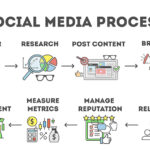In today’s competitive business landscape, marketing is crucial for driving growth and success. To achieve marketing success, businesses need to leverage the power of a Customer Relationship Management (CRM) system. This comprehensive guide will explore how integrating a CRM system with various marketing strategies can significantly enhance marketing effectiveness and drive tangible results.
I. The Power of SEO: Leveraging CRM for Enhanced Organic Visibility
Search Engine Optimization (SEO) plays a pivotal role in driving organic traffic and improving website visibility. By integrating a CRM system with SEO efforts, businesses can optimize their strategies for even greater success. Through CRM integration, businesses gain access to valuable customer data that can inform keyword targeting, content optimization, and user experience enhancement. With CRM insights, businesses can identify relevant keywords that align with customer preferences, track search trends, and create compelling content that resonates with the target audience. Additionally, CRM integration enables businesses to monitor SEO metrics such as organic traffic, keyword rankings, and conversion rates, providing valuable insights for continuous optimization and improvement.
II. Website Development: Creating Personalized Experiences with CRM Integration
Website development plays a critical role in delivering engaging user experiences. By integrating a CRM system with website development, businesses can take personalization to the next level. CRM integration allows businesses to leverage customer data to create dynamic and personalized website experiences. For example, businesses can dynamically display content, offers, and recommendations based on customers’ preferences and past interactions. Through CRM integration, businesses can create custom landing pages, forms, and personalized calls-to-action that cater to individual customer needs. Furthermore, CRM integration enables businesses to track website interactions, form submissions, and conversions, providing invaluable data to measure the effectiveness of their website development efforts and make data-driven optimizations for better results.
III. Social Media Marketing: Understanding and Engaging with Customers
Social media marketing is a powerful tool for building brand awareness and engaging with the target audience. Integrating a CRM system with social media efforts enhances these marketing endeavors. CRM integration provides businesses with a deep understanding of their customers, including their preferences, behaviors, and demographics. With this knowledge, businesses can create highly targeted and relevant social media content that resonates with specific customer segments. CRM integration enables businesses to track social media interactions and engagements, analyze customer responses and sentiments, and measure the impact of social media efforts on lead generation and customer acquisition. By leveraging CRM insights, businesses can refine their social media strategies, deliver personalized content, and engage with their audience in a more meaningful way.
IV. PPC Advertising: Optimizing Campaigns with CRM Insights
Pay-Per-Click (PPC) advertising is an effective method for driving targeted traffic and generating leads. Integrating a CRM system with PPC campaigns takes these efforts to the next level. By leveraging CRM insights, businesses can optimize their PPC campaigns for maximum effectiveness. CRM integration allows businesses to identify high-value customer segments and create PPC campaigns that specifically target these segments. By aligning CRM data with PPC ad targeting, businesses can select relevant keywords, create compelling ad copy, and optimize bidding strategies. Moreover, CRM integration enables businesses to track and measure the ROI of their PPC campaigns, providing valuable insights into which keywords and ad variations are driving conversions. With CRM integration, businesses can continually refine and optimize their PPC campaigns based on data-driven insights, improving lead generation and conversion rates.
V. Email Marketing: Personalization and Automation with CRM Integration
Email marketing remains a highly effective channel for nurturing leads and driving conversions. Integrating a CRM system with email marketing campaigns empowers businesses to deliver personalized and automated experiences. CRM integration allows businesses to leverage customer data to create highly targeted and personalized email campaigns. By segmenting the email list based on customer preferences, behaviors, and demographics, businesses can send relevant and tailored content to specific audience segments. CRM integration enables businesses to automate email sequences, triggered by specific customer behaviors or milestones, ensuring timely and targeted communication. Furthermore, CRM integration provides valuable data on email performance, including open rates, click-through rates, and conversions, allowing businesses to measure the effectiveness of their email campaigns and make data-driven optimizations for better engagement and conversion rates.
Conclusion:
Integrating a CRM system with various marketing strategies is a game-changer for businesses. From SEO to website development, social media marketing, PPC advertising, and email marketing, CRM integration enhances marketing effectiveness across the board. By leveraging CRM insights, businesses can optimize strategies, personalize customer experiences, engage with the target audience, and drive better results. Embracing the power of a CRM system in marketing efforts is a wise investment for businesses seeking to maximize their marketing success and achieve long-term growth.

Since its launch in 2016, Bizbotweb has been at the forefront of empowering businesses and individuals to easily navigate the digital world, from owning their intellectual property to managing websites and simplifying WordPress setups. As the author of our articles, the “Chief Robot” brings a wealth of knowledge and innovation, embodying Bizbotweb’s commitment to making digital presence seamless and accessible for everyone. Focusing on integrated digital marketing efforts, our content is designed to guide users through the evolving digital landscape, ensuring they have the tools and insights needed to thrive online.
Blog Categories
Check out other Pages
Have questions?
Schedule a free consultation if you have questions about our digital marketing services or would like additional information.









